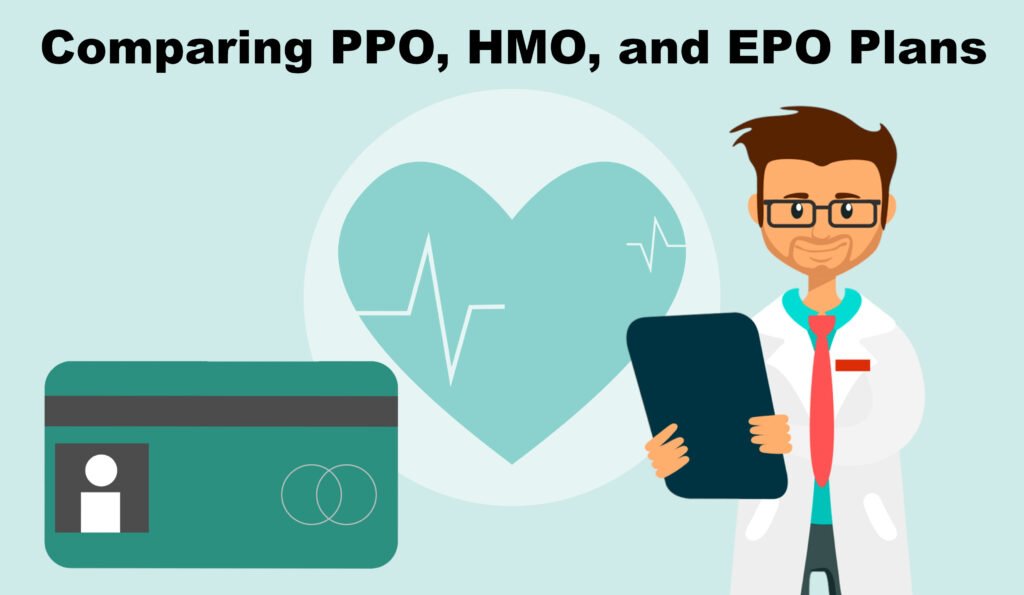Choosing the right health insurance plan is one of the most important decisions you can make for your health and financial well-being. With a range of options available—from Health Maintenance Organizations (HMOs) and Preferred Provider Organizations (PPOs) to Exclusive Provider Organizations (EPOs)—understanding the nuances of each plan type can help you select the one that best fits your needs.
In this article, we break down these three plan types, compare their benefits and drawbacks, and offer guidance on how to choose the best option for you.
What Insurance Plan Is Best for You?
In today’s complex healthcare environment, finding a plan that offers the right balance of cost, convenience, and coverage is critical. Each type of plan—HMO, PPO, and EPO—has unique features:
- HMOs typically emphasize preventive care and cost-efficiency.
- PPOs offer flexibility and broader provider networks.
- EPOs provide a middle ground with a limited network and no referral requirements.
Understanding these distinctions can help you avoid common pitfalls and make an informed decision. In the following sections, we provide an in-depth analysis of each type, supported by real-world scenarios and data from reputable sources such as the Kaiser Family Foundation and the Centers for Medicare & Medicaid Services (CMS).

Prefer to listen rather than read?
Health Insurance Plan Types
There are three primary types of health insurance plans to choose from: Preferred Provider Organization (PPO), Health Maintenance Organization (HMO), and Exclusive Provider Organization.
Each of these types of health insurance plans has unique advantages and disadvantages and understanding the differences between them is key when it comes to making the right decision for you and your family.
What Is a PPO (Preferred Provider Organization)?
A Preferred Provider Organization (PPO) is an organized network of medical care providers that contract with health insurance plan companies to provide services to their clients at a cost. PPO plans offer flexibility when it comes to choosing healthcare providers, as well as giving patients the freedom to seek care outside of their network.
Preferred Provider Organization (PPO) plans hold a significant place by providing a unique balance between accessibility and freedom for patients.
Key Features
- Flexibility in Provider Choice: PPOs offer a larger network of doctors and hospitals and typically allow you to see providers outside the network, though at a higher cost.
- No Referral Requirement: You can see specialists without needing a referral from a primary care physician.
- Higher Premiums: This flexibility generally comes with higher monthly premiums and higher out-of-pocket costs compared to HMOs.
- Coverage for Out-of-Network Services: Although using out-of-network providers usually means paying more, PPOs still offer some level of reimbursement.
Pros and Cons
Pros:
- Greater flexibility in choosing healthcare providers
- No need for referrals to see specialists
- Coverage for both in-network and out-of-network care
Cons:
- Higher monthly premiums and cost-sharing requirements
- More complex billing and claims processes
- Potential for unexpected higher costs if using out-of-network services
Example Scenario
Consider a situation where you have a chronic condition that requires frequent visits to specialists, or you live in an area with limited in-network options. The flexibility of a PPO might outweigh the higher cost, allowing you to access the best possible care without referral delays.
These health insurance plans are especially beneficial for individuals who encounter difficulties accessing healthcare because of their location or a restricted number of available healthcare providers. When it comes to PPO plans, patients can enjoy the convenience of receiving care from a wide network of healthcare providers.
With its extensive network, patients under PPO plans enjoy a wide array of choices when seeking medical care. Whether it’s consulting with a primary care physician, seeing a specialist, or needing hospital care, PPO plans usually offer a diverse range of providers within their networks.
PPOs typically offer clients access to a wide range of doctors and healthcare services, including specialists, diagnostic labs, and hospitals. PPOs also often feature a cost-sharing arrangement in which the insurance company covers most of the costs associated with healthcare services provided by the network.
Health Maintenance Organization (HMO)
A Health Maintenance Organization (HMO) is a type of managed care organization that provides comprehensive healthcare services through a network of providers who agree to offer services to members at reduced costs.

An HMO typically offers its members a wide range of healthcare services such as:
Preventive Care
- Preventive care is a type of healthcare that focuses on the prevention of disease and injury. It helps individuals stay healthy and can reduce the risk of developing medical conditions in the future.
- It is important to prioritize preventive care as it can help to save time and money that would otherwise be spent on expensive medical treatments.
- Regular preventive care can also provide individuals with a better quality of life and improved overall health.
- This can include activities such as regular physicals, immunizations, screenings, and lifestyle modifications.
Primary Care
- Primary care is an essential component of healthcare, as it’s the first point of contact for individuals seeking medical assistance.
- It involves the provision of comprehensive and ongoing healthcare services, focusing on disease prevention and health promotion.
- Primary care providers can include family physicians, general practitioners, pediatricians, nurse practitioners, and physician assistants.
- Primary care is typically the first point of contact for patients and provides the initial diagnosis and treatment of commonly encountered illnesses and injuries.
- Primary care physicians are often responsible for the coordination of care with other healthcare providers, including specialists, to ensure that patients receive the most appropriate care.
- Primary care is critical for the overall health of individuals, as it helps to ensure that medical conditions are detected and treated early before they become more serious.
Specialty Care
- Specialty care is an advanced level of medical care that focuses on a particular medical condition or set of conditions.
- Specialty care physicians have typically completed additional training and certifications, enabling them to provide expert-level treatments and services.
- Such services may include diagnostics, treatments, and surgeries related to a specific medical condition or group of conditions.
- Specialty care can improve the quality and outcomes of care, as it allows for more personalized, efficient, and timely treatments.
- Patients may choose to receive specialty care for a wide range of medical conditions, from rare and complex illnesses to chronic conditions that require ongoing management.
- Specialty care can also provide access to the latest treatment options and medications.

Mental Health Services
- Mental health services are an important component of overall health and well-being.
- Mental health professionals, such as psychiatrists, psychologists, counsellors, and social workers, provide a range of services to promote positive mental health and well-being.
- These services may include assessments of mental health status, diagnosis of mental health disorders, and treatment of mental health disorders.
- Treatment may include individual, family, or group counselling; medication management; and other evidence-based therapies such as cognitive-behavioural therapy, dialectical-behavioural therapy, and interpersonal therapy.
- Mental health services can help individuals and families better understand, manage, and cope with mental health disorders and improve their overall quality of life.
- With proper treatment, individuals may be able to lead more productive and fulfilling lives.
Hospitalization
- It is typically used when a patient requires medical care that cannot be provided on an outpatient basis and is also used when a patient needs to be monitored for some time.
- The decision to hospitalize a patient depends on the severity of their condition and the availability of appropriate treatments in an outpatient setting.
- During hospitalization, a patient receives care from a multidisciplinary team of medical professionals, including physicians, nurses, physical therapists, occupational therapists, social workers, and other specialists.
- The team works together to provide the best possible care to help the patient return to their highest level of functioning.
Pros and Cons
Pros:
- Lower premiums and copayments
- Strong emphasis on preventive care
- Coordinated care through a designated PCP
Cons:
- Limited choice of providers
- Requires referrals to see specialists
- Less flexibility for out-of-network care
Example Scenario
Imagine you live in an urban area where most high-quality providers are within the HMO network. If you value lower costs and your healthcare needs are relatively routine, an HMO could be the right choice for you.
HMOs, aim to provide quality, cost-effective health care by managing the medical care provided to their members. In order to be eligible for an HMO plan, members must typically be employed or have a family member who is enrolled in the plan. HMOs, offer a variety of plans, so members can choose the coverage that best fits their needs.
Exclusive Provider Organization (EPO)
Exclusive Provider Organizations (EPOs) are a type of managed care health insurance plan that provides coverage for medical services from a specific network of providers. Patients enrolled in an EPO must use the designated network of providers for their care and cannot seek services from outside of the network without prior approval.
Key Features
- Network Restrictions with No Referrals: EPOs require you to use in-network providers for non-emergency care, similar to HMOs, but you don’t need a referral to see specialists.
- Cost Efficiency: EPOs often fall between HMOs and PPOs in terms of cost. They may offer lower premiums than PPOs while providing a bit more flexibility than HMOs.
- Emergency Coverage: Out-of-network coverage is usually limited to emergency situations only.
Pros and Cons
Pros:
- No need for referrals while still maintaining lower costs than PPOs
- Clear and straightforward network guidelines
- Suitable for those who are comfortable with a limited provider network
Cons:
- No out-of-network benefits except in emergencies
- A limited provider network may mean fewer choices
- Less comprehensive coverage for specialist care if your preferred provider is outside the network
Example Scenario
If you’re relatively healthy and mostly need routine care from a trusted group of providers, an EPO could be an excellent middle ground—providing a balance of cost savings and direct access to specialists without the extra referral step.

Pros and Cons of PPO, HMO, and EPO Plans
Each health insurance plan type has its own set of pros and cons, so it’s important to understand the differences between them before making a decision.
Side-by-Side Comparison
| Feature | HMO | PPO | EPO |
| Provider Choice | Limited to network | Broad, including out-of-network | Limited to network |
| Referral Requirement | Yes, from a PCP | No | No |
| Cost (Premiums & Copays) | Generally lowest | Generally highest | Moderate |
| Flexibility | Less flexible | Most flexible | Moderately flexible |
| Out-of-Network Coverage | Rarely covered | Covered at higher cost | Only in emergencies |
Out-of-Pocket Costs
- PPOs
- Out-of-pocket costs for PPOs, such as deductibles, copays and coinsurance, will depend on the kind of services received.
- Premiums tend to be higher on these plans and out-of-pocket expenses, such as deductibles, are usually more costly.
- The advantage of a PPO plan is the ability to access providers both in-network and out-of-network, without the need for referrals; however, this flexibility comes at a cost.
- HMOs
- One of the benefits of an HMO is that members typically have lower out-of-pocket costs for medical services and prescription drugs.
- HMO healthcare providers offer services to members at discounted rates.
- EPOs
- The out-of-pocket cost associated with the use of an EPO health plan can vary significantly depending on the individual’s healthcare needs and the specific plan in which they are enrolled.
- Typically lower than PPO but higher than HMO
- Generally speaking, EPOs require members to pay a fixed co-payment for each doctor’s visit and/or procedure, in addition to a fixed co-insurance amount for each prescription filled.
- In some cases, members may also be responsible for a deductible that must be met before the insurance company begins to pay for services.

Referral Requirements
- PPOs
- Allow members to select a primary care physician and to visit any other network provider without a referral.
- HMOs
- Depending on the specific HMO plan, members may be required to obtain a referral from their primary care physician before accessing specialty care services such as physical therapy, mental health, and other specialized care.
- It is important to understand the specific requirements of your HMO plan in order to ensure that you have the necessary referrals when seeking specialty care.
- It is also important to note that not all HMO plans require referrals.
- EPOs
- EPO plans provide coverage without the need for referrals when settling bills with in-network doctors and hospitals.
- However, treatments taken outside of the network are not covered, so it is important to ensure that all care providers are part of the network to avoid any unforeseen financial surprises.
Access to Specialist
- PPO
- Preferred Provider Organizations (PPOs) offer their members access to a broad network of specialist providers.
- This type of access allows members to benefit from the expertise of specialized healthcare professionals, ensuring that members receive the highest quality of care for their specific medical needs.
- HMO
- Health Maintenance Organizations (HMOs) provide access to a variety of specialists in the healthcare field.
- Depending on the plan, members may have access to specialists in the fields of primary care, mental health, and specialty care.
- EPO
- An Exclusive Provider Organization (EPO) is an arrangement between a healthcare provider and a health plan that provides enrollees with access to certain specialists and services.
How to Choose the Right Plan for You
When deciding between an HMO, PPO, and EPO, consider the following factors:
- Your Healthcare Needs:
- Routine vs. Specialized Care
- If you expect to need many specialist visits, a PPO might be better despite the higher cost.
- Chronic Conditions
- For ongoing care with minimal hassle, an HMO’s coordinated care may be advantageous.
- Routine vs. Specialized Care
- Financial Considerations:
- Premiums vs. Out-of-Pocket Costs
- Determine your budget for monthly premiums and how much you can afford to pay when you need care.
- Deductibles and Copays
- Evaluate how cost-sharing might impact you during the year.
- Premiums vs. Out-of-Pocket Costs
- Provider Preferences:
- Current Providers
- If you have established relationships with certain doctors, check if they are included in the plan’s network.
- Flexibility Needs
- Consider whether you prefer the freedom to choose any provider or if you’re comfortable with a defined network.
- Current Providers
- Geographic Factors:
- Local Availability
- Ensure the plan’s network covers providers in your area, especially if you travel frequently or live in a rural area.
- Local Availability
- Plan Ratings and Reviews:
- Reputation
- Look for reviews and ratings from reputable sources such as the National Committee for Quality Assurance (NCQA) to gauge plan quality.
- Reputation
Conclusion
Choosing the right health insurance plan is a personal decision that depends on your unique healthcare needs, financial situation, and provider preferences. HMOs offer cost-effective, coordinated care with an emphasis on prevention, while PPOs provide the flexibility to choose any provider without referrals. EPOs bridge the gap by offering moderate costs with straightforward access to in-network providers.
By understanding the features, benefits, and limitations of each plan type, you can make a more informed decision and select a plan that aligns with your health priorities. Always consult additional resources and consider speaking with a licensed insurance advisor to ensure you have all the information you need.
Disclaimer:
We are not investment advisors. Our content is intended for guidance and educational purposes only. Before making any investment decisions, it is strongly recommended that you seek advice from a licensed financial advisor or conduct thorough research to ensure that your choices align with your individual financial goals and risk tolerance.
Please remember that all investments carry inherent risks, and past performance is not indicative of future results.



















